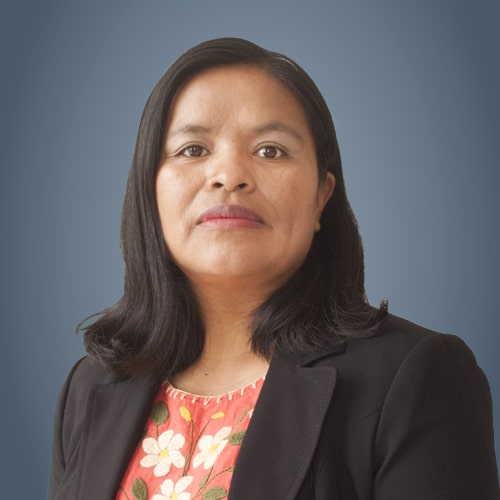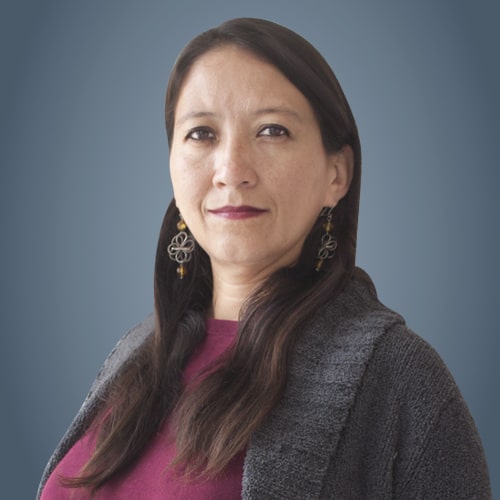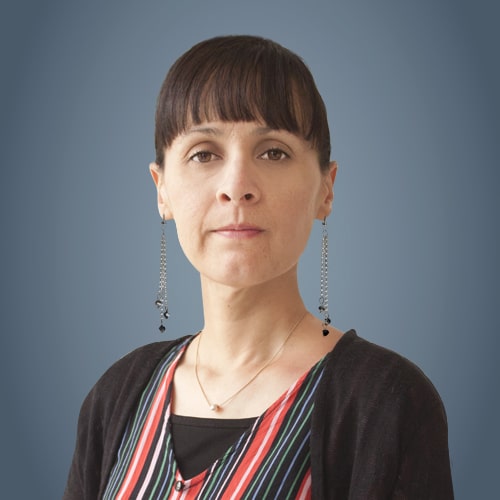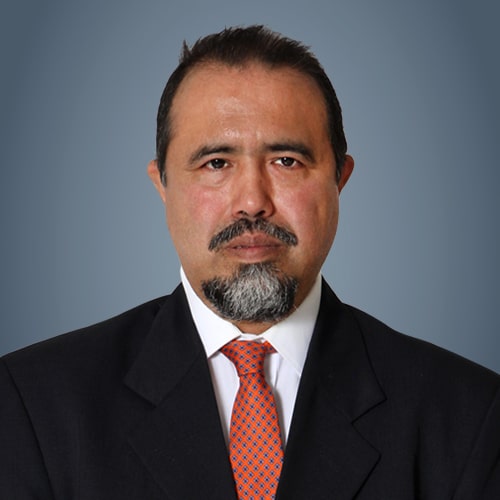DISCIPLINARY BACKGROUND
Why study the PhD in Population Studies?
The PhD in Population Studies responds to the need to study the demographic dynamics of contemporary societies. In addition to the analysis of the basic components of a population (mortality, fertility, migration), the PhD has incorporated the analysis of emerging topics such as labor studies, aging, environment, family and ethnicity. The latter is a line of research that this program is cultivating given Mexico's ethnic composition and the need to make vulnerable populations statistically visible. In Mexico there are only two doctoral programs in Population Studies, ours is one of them and is attached to the Center for Population Studies founded in 1991, this center is also one of the few that are located in public universities.
To develop in the student the formation of a researcher in the area of population studies related to demographic dynamics and its articulation with social, economic, political, cultural, educational, health, territorial and environmental processes; to enable him/her to design, execute, coordinate and evaluate research projects in an autonomous manner and in interdisciplinary teams to solve scientific, technical and social problems.
To provide students with cutting-edge knowledge related to population studies that will allow them to investigate and propose alternative solutions to society's problems.
To provide the necessary tools and training to enable students to disseminate the products of the scientific and technological work they develop and establish links with the sectors of society.
The Lines of Knowledge Generation and Application associated with this program are:
- Contemporary demographic dynamics: studies population change originated by its three components: births, deaths and migration, their interaction and their social, economic, political and territorial manifestations in asymmetric populations, such as the Latin American, Mexican and Hidalgo populations, and subpopulations such as indigenous populations, among others.
The following research fields are derived from this LGAC:
- Migration and mobility
- Indigenous population
- Policies and population
- Population and environment
- Poverty, inequality and vulnerability
Social change in the face of development processes: studies the change in social structures, its consequences and manifestations in the face of development processes, including aspects of success such as the promotion of employment and of failure such as poverty, inequality and vulnerability. It has as its analytical core the migratory processes and the metropolization that occurs in the center of the Mexican Republic.
The following research fields are derived from this LGAC:
- Employment
- Migration and mobility
- Indigenous population
- Policies and population
- Poverty, inequality and vulnerability
Basic Academic Core
- We have 10 research professors with doctoral degrees.
Dr. Asael Ortiz Lazcano
- Magazine articles
- (2015). El envejecimiento demográfico del futuro visto desde la arista de las trasferencias económicas en el estado de Hidalgo, in Revista Electrónica Academia Journals, Vol 1, N° 1, p. 1-30.
- (2015)Sociodemographic characteristics of university pregnancy at UAEH, in Revista Electronica Academica Journals.
- (2016). Derechos humanos y población envejecida en Hidalgo, historia de una muerte continua, in Revista Iberoamericana de Ciencias Sociales y Humanidades, Vol 1, N°1, p. 1-27.
- (2016). Sexual practices and behavior in residents of the city of Pachuca, in Academia Journals 2016 Tuxman.
- Chapters in books
- (2015). Entitlement in the state of Hidalgo. 2000-2010. In Treinta años de historia del Centro de Estudios de Población de la UAEH, Mexico: UAEH.
- Sociodemographic characteristics of university pregnancy in the UAEH, 2014. In Compendio Investigativo de Academia Journals Celaya 2015, Guanajuato, Mexico, Instituto Tecnologico de Celaya.
- (2015). The demographic aging of the future as seen from the economic transfer perspective in the state of Hidalgo. In Compendio Investigativo Academia Jounals Cordoba 2015, Veracruz, Mexico.
- (2018). Social construct of aging. In La Obra perdurable de Marx, Mexico, Universidad Autónoma de Zacatecas.
- (2018). Reflections on the Marxist perspective and population. In La Obra perdurable de Marx, Mexico, Universidad Autónoma de Zacatecas.
- (2018). Demographic characteristics of abstentionism in recent elections in the state of Hidalgo. in La investigación y sus contribución a la formación profesional.
- Books
- (2015). Thirty years of history of the Center for Population Studies of the UAEH. Mexico, UAEH.
- (2015). Estudios demográficos del Estado de Hidalgo, Volume V, co-authored with Germán Vázquez Sandrin, Mexico: UAEH.
- (2015). Temas de investigación social en México, 2014. Volume I Población indígena y migraciones, co-authored with Angélica Reyna and Germán Vázquez Sandrin, Mexico, UAEH.
- (2015). Temas de investigación social en México, 2014. Volume III. Educación, movimientos sociales y sociedad, co-authored with Germán Vázquez Sandrin, María Félix Quezada, Tomás Serrano and Angélica Reyna, Mexico, UAEH.
- (2015). Temas de investigación social en México, 2014. Volume IV. Políticas públicas y derechos, co-authored with Angélica Reyna, María Félix Quezada, Tomás Serrano and Germán Vázquez Sandrin, Mexico, UAEH.
- (2015). Temas de investigación social en México, 2014. Volume II. Políticas públicas y derechos, co-authored with Angélica Reyna, María Félix Quezada, Tomás Serrano and Germán Vázquez Sandrin, Mexico, UAEH.
- (2016). Derechos humanos y envejecimiento demográfico en Hidalgo, un binomio divergente, Mexico, CASTEDEL.
- (2018). Demographic aging in HIdalgo in the light of human rights, Tomo 1, Mexico, 12 Editorial.
Dr. Germán Vázquez Sandrín
- Articles and reviews
- (2015). Mexico's self-ascribed indigenous people in the 2010 census: revitalization or census overestimation?, In Papeles de población, Vol 21, N°86, p. 171-218.
- - (2018). The emancipation of urban indigenous youth in Mexico, In Revista Lationoamericana de Población, Vol 12, N° 22, p. 85-105.
- Chapters in books
- (2015). The postponement of children in urban women of rural and indigenous origin in Mexico based on the EDER 2011. In Estudios demográficos en el Estado de Hidalgo. Volume VI (271-300). Mexico, UAEH.
- (2015). Use of Retrospective Demographic Surveys for the Study of Social Mobility. In Thirty years of history of the Center for Population Studies of the UAEH (39-48). Mexico, UAEH.
- (2015). The urban indigenous population through the EDER 2011. In Temas de investigación social en México, 2014. Volume I (15-28). Mexico, UAEH.
- (2015). Access and quality of health services in the indigenous population of Mexico. In Temas de investigación social en México, 2014. Volume 1 (97-110). Mexico, UAEH.
- (2015)Work and social benefits in the city of Pachuca, Hidalgo. In Historias laborales en Pachuca (161-182), Mexico, UAEH.
- (2016). Urban indigenous populations in Mexico and their reproductive behavior. In Generations, life course and social inequality in Mexico (77-107). Mexico, El Colegio de México.
- (2016). Food security in preschool and school households of the NUTREH Strategy 2014-2015. In Estrategia NUTREH. Evaluación de la Estrategia de Atención a la Nutrición Infantil en Municipios Prioritarios del Estado de Hidalgo (130-149). Mexico, UAEH.
- Books
- (2015). Demographic studies of the state of Hidalgo. Volume V, co-authored with Asael Ortiz Lazcano, Mexico, UAEH.
- (2015). Temas de investigación social en México, 2014. Volume I Población indígena y migraciones, co-authored with Asael Ortiz Lazcano and Angélica Reyna Bernal, Mexico, UAEH.
- (2015). Temas de investigación social en México, 2014. Volume III. Educación, movimientos sociales y sociedad, co-authored with Asael Ortiz, María Félix Quezada, Tomás Serrano and Angélica Reyna, Mexico, UAEH.
- (2015). Temas de investigación social en México, 2014. Volume IV. Políticas públicas y derechos, co-authored with Angélica Reyna, María Félix Quezada, Tomás Serrano and Asael Ortiz, Mexico, UAEH.
- (2015). Temas de investigación social en México, 2014. Volume II. Desarrollo y pobreza, co-authored with María Félix Quezada, Asael Ortiz, Tomás Serrano and Angélica Reyna, Mexico, UAEH.
- (2018). Participatory diagnosis of the indigenous populations of the state of Hidalgo. Hacia la conformación de un programa estatal de población indígena, Mexico, UAEH.
Dr. Angélica Elizabeth Reyna Bernal
- Magazine articles
- 2016. Serrano Avilés, Tomás; Emmanuel Galindo Escamilla and Angélica E. Reyna Bernal "Milpa o Bosque. Encrucijada en localidades marginadas", in Revista Agroproductividad, Year 9, Vol. 9, No. 10, Mexico, pp. 45-49.
- Book chapters:
- 2018. Dettmer, J.; Angulo, Y., and Reyna, A. "Vulnerabilidad social y sociodemográfica en el estado de Hidalgo, México" in Ibarra, R.; Arizmendi, L.; Ibarra, R.; and Hernández, J.L. (coords.) La obra perdurable de Marx a 200 años de su natalicio, ISBN 978-607-9455-59-0, Zacatecas, Mexico, pp. 285-294.
- 2017. "Economic participation of women and migration in the state of Hidalgo, Mexico" in Ibarra, R.; Bueno, E.; Ibarra, R.; and Hernández, J.L. (coords.) La humanidad frente a los desafíos del capitalismo decadente, ISBN 978-607-9455-43-9, Zacatecas, Mexico, pp. 4340-4350.
- 2015. "Internal migration and territorial redistribution of the population in the state of Hidalgo, 1980-2010," in Ortiz, Quezada, Reyna, Serrano and Vázquez (2015) Thirty years of history of the Center for Population Studies of the UAEH, ISBN 978-607-482-397-4, UAEH, Pachuca, Hidalgo, Mexico, pp. 155-172.
- 2015. "Migración y urbanización en México: una exploración a la región Hidalgo-Puebla-Tlaxcala", in Ortiz, A. and Vázquez, G. (coords.) (2015) Estudios Demográficos del Estado de Hidalgo, Tomo V, UAEH, ISBN 978- 607-482-423-0, ISBN obra completa 978-607-482-212-0, pp. 183-214.
- Books
- 2015. Ortiz, A. Quezada, M., Reyna, A., Serrano, T. and Vázquez, G. Thirty years of history of the Center for Population Studies of the UAEH, ISBN 978- 607-482-397-4.
- 2015. Reyna, A.; Ortiz, A.; Vázquez, G.; Serrano, A. and Quezada, M. (coords.) Temas de Investigación Social en México, 2014, Tomo III Educación, movimientos sociales y sociedad, UAEH, ISBN volume: 978-607-482-442-1, ISBN complete work: 978-607-482-439-1, Mexico, 354 pp.
Dr. Tomás Serrano Avilés
- Magazine articles
- (2017). Gênese e constituição da região fronteiriça de Corumbá: de fronteIra indígena a unidade espacial de integração transnacional, Revista Territorios e Froneiras, co-authored with Manetta.
- (2017). Food Autonomy: Use and Conservation of Edible Plants in a Marginalized Context in the State of Hidalgo (Mexico). International Journal of Humanities and Social Science Invention ISSN (Online): 2319 - 7722, ISSN (Print): 2319 - 7714,
- (2017). co-authored with Manetta, Galindo, Hernandez and Sosa.
- (2018). Stationarity, breaks and trends in Mexico's international migration: causes and consequences, in Population papers, UAEM, co-authored with Zeus Salvador Hernández.
- Book chapters
- (2015). La migración internacional en Hidalgo: su dinámica y cambio en tres décadas (1980-2010) co-authored with María Félix Quezada, published in Treinta años de Historia del Centro de Estudios de Población de la UAEH, pp. 11-38, Mexico, UAEH.
- Books
- (2015). Thirty Years of History of the Center for Population Studies of the UAEH, co-authored with Asael Ortiz Lazcano, María Félix Quezada, Germán Vázquez Sandrin and Angélica E. Reyna Bernal, Mexico, UAEH.
- (2015). Temas de investigación social en México, 2014. Volume II: Development and Poverty, in coordination with Germán Vázquez, Angélica Reyna, María Félix, Quezada and Asael Oriz, Mexico, UAEH.
Dr. María Félix Quezada Ramírez
- Magazine articles
- (2018). Trends in the internal migration of the indigenous population in Mexico, 1990-2015. In Estudios Demográficos y Urbanos volume 33, no.2 (98), May-August, co-authored with José Aurelio Granados Alcantar.
- (2018). International migration and local development: the experience of two Otomi localities in the Mezquital Valley, Hidalgo, Mexico. In Region and society, year xxx / no. 73.
- (2015). Mexico's Self-Ascribed Indigenous People in the 2010 Census: Ethnic Revitalization or Census Overestimation?" in Papeles de Población, Vol.21, Pag.171-218, Co-authored with Germán Vázquez Sandrin.
- Chapters in books
- (2018). Work and social reproduction: Family, fertility and female economic participation in Mexico. In La Obra perdurable de Marx a 200 años de su natalicio. Co-authored with María Valeria Judith Montoya García and Elsa Ortiz Ávila. Mexico, UAZ.
- (2018). Agricultural intermediation as a form of capital accumulation in the fields of agricultural labor farming the case of Mexico. In La Obra perdurable de Marx a 200 años de su natalicio. Co-authored with Julieta Lagos and Martha García. Mexico, UAZ
- (2018). The dynamics of international migration and remittances of the indigenous population in Mexico. In Transferencias salariales y migración indígena by Carolina Sánchez, Carlos Zolla and Genoveva Roldán (coordinators), UNAM. Co-authored with José Aurelio Granados Alcantar.
- (2016). Social reintegration.... Otomi migrants returned from the United States to the Mezquital Valley, state of Hidalgo. In Transcender el neoliberalismo y salvar a la humanidad, co-authored with Fidel García Cuevas and Dalia Cortés Rivera, Mexico, UAZ.
- (2015). Los nuevos escenarios de la migración internacional indígena en México co-authored with José Aurelio Granados Alcantar, published in La población Afrodescendiente e indígena en América Latina, UNFPA/CEDEPLAR/FORD FUNDATION/ALAP, 2015.
- (2015). La reproducción de la familia en un contexto de migración internacional in co-authorship with María Araceli Medellín Sánchez, published in Estudios Demográficos del Estado de Hidalgo, Volume VI. Mexico, UAEH, pp. 60-104.
- (2015). La migración internacional en Hidalgo: su dinámica y cambio en tres décadas (1980-2010) co-authored with Tomás Serrano Avilés, published in Treinta años de Historia del Centro de Estudios de Población de la UAEH, Mexico, UAEH, pp. 11-38.
- Books
- (2018). Reflections on local development and the contrasts of development in the most marginalized localities of Hidalgo, (coordinator), Mexico, UAEH, 2018.
- (2015). Demographic Studies of the State of Hidalgo, Volume VI, Mexico, UAEH, (Coordinator).
- (2015). Thirty Years of History of the Center for Population Studies of the UAEH, Mexico, UAEH (Co-authored with Asael Ortiz Lazcano, Tomás Serrano Avilés, Germán Vázquez Sandrin and Angélica E. Reyna Bernal), UAEH.
Dr. María Valeria Judith Montoya García
- Magazine articles
- (2016), "Labor income and household labor effort in Mexico during the economic crisis, 2008-2010," in Regional Economic Letter (in press).
- (2016), "Proveeduría laboral en los hogares familiares en las zonas urbanas de México, 2015", in Coyuntura Demográfica, no. 12.
- (2014), "Reflexiones sobre la medición de la magnitud, características y condiciones de la participación económica de la población mexicana en la encuesta intercensal 2015", in Coyuntura Demográfica, núm. 7. (coauthors v.v.).
- Outreach articles
- (2015) "Ayotzinapa, el bono demográfico y los jóvenes", in Boletín Ciudades y regiones, no. 12, 2015, Seminario de Análisis Regional y Estudios Espaciales, Facultad de Estudios Superiores-Acatlán. Electronic publication, downloadable at: http://www.saree.com.mx/unam/node/109
- "La precarización del trabajo en México, 1982-2000," in Boletín de Análisis Económico, No. 3, 2002, UAM-Azcapotzalco, pp. 25-30.
- Chapters in books
- (2017) "Condiciones de vida de los hogares trabajadores en las zonas urbanas de México durante la crisis, 2008-2010", in Nájera, Jessica, Brígida García and Edith Pacheco (coord.), Hogares y trabajadores en México en el siglo XXI, El Colegio de México, Mexico City.
- (2016), "Del desempleo a la desocupación. Alcances y limitaciones de los cambios en la medición de la fuerza de trabajo sobre las estadísticas de desocupación en México", in Emma Liliana Navarrete (coord.), No todo el trabajo es empleo. Avances y desafíos en la conceptualización y medición del trabajo en México, Instituto de Investigaciones Jurídicas-UNAM, El Colegio Mexiquense, Toluca. (Co-authors S.C. Gaxiola Robles Linares and M.C. Márquez Scotti).
- Books
- (2017), "Households in the crisis. Trabajo y condiciones de vida en México, 2008.2010", Economic Commission for Latin America and the Caribbean, Instituto de Investigaciones Económicas-UNAM.
Dr. Elsa Ortiz Avila
- Magazine articles
- 2018, Trabajo y reproducción social: Familia, fecundidad y participación económica femenina en México. La obra perdurable de Marx a 200 años de su natalicio, 2018 in co-authorship with María Valeria Judith Montoya García.
- 2018, Political exclusion in the State of Hidalgo, Mexico; from the 2010 National Discrimination Survey. Revista Conjeturas Sociológicas, No. 17, p. 116-142, Dec. ISSN 2313-013X. Co-authored with Carlos Mejía.
- 2018, The emancipation of urban indigenous youth in Mexico. Revista Latinoamericana de Población, [S.l.], No. 22, p. 85-105, Jun. ISSN 2393-6401. Co-authored with Germán Vázquez.
- 2018, Evolution of fertility behaviors by birth order and educational level in Colombia and Dominican Republic. Revista Novedades en Población. NO. 14. ISSN 1817-4078. Co-authored with Daniel Devolder.
- 2017, The absence of educational history in the analysis of events related to the transition to adulthood. Revista Latinoamericana de Población, [S.l.], No. 21, p. 95-112, Dec. ISSN 2393-6401. Co-authored with Daniel Devolder.
- 2016, The effect of the duration of studies on family formation in Mexico and Spain. Revista Latinoamericana de Población, [S.l.], n. 19, p. 127-148, Dec. ISSN 2393-6401. Co-authored with Daniel Devolder.
- 2016, Human fertility database documentation: spain. max Planck Institute for Demographic Research (MPIDR) and the Vienna Institute of Demography (VID). Co-authored with: Daniel Devolder and Kryštof Zeman.
- Book chapters
- 2018. Work and social reproduction: Family, fertility and female economic participation in Mexico. In The enduring work of Marx. A 200 años de su natalicio.
Dr. José Aurelio Granados Alcantar
- Magazine articles
- (2018). Trends in internal migration of the indigenous population in Mexico, 1990-2015. In Estudios Demográficos y Urbanos volume 33, no.2 (98), co-authored with María Félix Quezada Ramírez.
- (2018). Niñas, niños y adolescentes de retorno en el estado de Hidalgo In Huellas de Migración, co-authored with Juan Pablo Téllez Plata.
- (2018). El proceso de transición a la edad adulta de los jóvenes mexicanos sin experiencia migratoria a Estados Unidos, 2010 In Espacio Innovación más Desarrollo, co-authored with José Alfredo Jáuregui Díaz and María de Jesús Avila Sánchez.
- (2018). Return migration from the United States to Mexico in a time of economic and political crisis. In Huellas de la migración, co-authored with Merari Stephanie Montoya Ortiz.
- (2017). Migración y movilidad laboral entre las zonas metropolitanas de la región centro, co-authored with Laura Myriam Franco. In Papeles de población.
- (2016). Mexico Internal Migration Index 2014, co-authored with Merari Stephanie Montoya Ortiz. In Huellas de la migración.
- Chapters in books
- (2018). La dinámica de la migración internacional y las remesas de la población indígena en México in Transferencias salariales y migración indígena, UNAM in co-authorship with María Félix Quezada Ramírez.
- (2018). Diagnosis of the localities of very high marginalization of Hidalgo, Mexico: challenges for local and regional development. In Reflexiones sobre el desarrollo local y los contrastes del desarrollo en las localidades más marginadas de Hidalgo, UAEH in co-authorship with María Félix Quezada Ramírez, Edgar Noé Blancas Martínez and Tomás Serrano Avilés.
- (2017). Neoliberalism and the reasons for the centrality of labor in Mexico. In Subjetividad capital y poder, UAEH in co-authorship with Carlos Mejía Reyes.
- (2015). Labor insertion and immigration in the urban agglomeration of Pachuca. In Historias laborales de Pachuca, UAEH,
- (2015). Los nuevos escenarios de la migración internacional indígena en México. In Población afro descendiente e indígena en América Latina, UAEH in co-authorship with María Félix Quezada Ramírez.
- Books
- (2015). Labor histories of Pachuca. Coordinator, Pachuca de Soto, Mexico, UAEH.
- (2015). Las comunidades indígenas de Hidalgo, Cardonal, Vol I,II y III. coordinator Pachuca de Soto, Mexico, UAEH.
Dr. Edgar Noé Blancas Martínez
- Magazine articles
- Violence and precariousness in the entrepreneur in the post-wage society. Veredas. Journal of sociological thought, (34) 225-245, 2017.
- Violence in entrepreneurship. TLA-MELAUA, Revista de Ciencias Sociales, (43) 178-199, 2017, co-authored with Carlos Mejía Reyes.
- Chapters in books
- Place matters. Population and social profiles of the Central American migrant's places of transit, on the subject of migration. In Quezada Ramírez, María Félix Estudios demográficos en el estado de Hidalgo. Volume VI. Mexico, UAEH, 2015.
- Regulation and gender in labor precariousness. The case of three generations of women and men workers in the city of Pachuca, 1965 - 2010. In Granados Alcantar, José Aurelio Historias laborales de Pachuca. Mexico, UAEH, 2015.
- Books
- Subjectivity, capital and power. Una aproximación al análisis de dis-posiciones neoliberales, Mexico, UAEH, 2017 (Coordinator).
Dr. Laura Myriam Franco Sánchez
- Magazines
- (2018). Servicios complementarios de la habitabilidad en las viviendas de la Zona Metropolitana de Toluca, México, in RIEM Revista Iberoamericana de Estudios Municipales, co-authored with Omar Ávila, Marcelino García and Marlene Urzuegía.
- (2017). "Migración y movilidad laboral entre las zonas metropolitanas de la región centro de México" in Papeles de Población, volume 23, number 91, Mexico, co-authored with José Aurelio Granados Alcantar.
- (2016). Return Migration and Employment in Mexico, International Journal of Humanities and Social Science, Vol. 6, No. 11; November 2016, pp.42-49, Los Angeles CA, USA).
- (2016). The social cohesion system and its effects on the crime rate. Ciencia Ergo Sum, vol. 23, no. 1, co-authored with Basilio Guerrero Escamilla and Sonia Bass Zavala.
- (2016). City marketing and regional planning. Revista Ciudades no. 112, October-December 2016, pp. 2-7. Red de Investigación Urbana A.C, Puebla, Mexico, co-authored with Jesús Enciso.
- Book Chapters
- (2016). Population inequality in the local electoral districts of the state of Hidalgo as a consequence of migratory processes in (Barra etal.) Problemas electorales a nivel subnacional: Democracia, participación y sociedad. Editorial Universidad Autónoma del Estado de Hidalgo, co-authored with José Aurelio Granados.
- (2016). Changes and trends in the labor market of those born in the city of Pachuca. in Granados Historias laborales de Pachuca. Editorial Universidad Autónoma del Estado de Hidalgo. Mexico.
- (2016). Habitability conditions in two metropolitan areas of the megalopolis of Mexico. In: El desarrollo regional frente al cambio ambiental global y la transición hacia la sustentabilidad. Asociación Mexicana de Ciencias para el Desarrollo Regional, A. C., Mexico. Co-authored with Omar Ávila and Marcelino García.
- (2016). Regional integration as a dynamic element of economic development in the state of Hidalgo. In: El desarrollo regional frente al cambio ambiental global y la transición hacia la sustentabilidad. Asociación Mexicana de Ciencias para el Desarrollo Regional, A. C, Mexico. Co-authored with Ham Mejía and Carlos Nai Him.
- (2015). Regional differentiation in labor markets in Mexico, in Quezada, Demographic Studies in the State of Hidalgo, volume VI. Universidad Autónoma del Estado de Hidalgo, Mexico. Co-authored with Omar Ávila.
- (2015), The demographic situation. Evolution and new configurations of families in Tulancingo, Hidalgo, in Estudios Demográficos del Estado de Hidalgo, Tomo V. Universidad Autónoma del Estado de Hidalgo, Mexico.
- (2015). Migración y trabajo en la ciudad de Pachuca, Hidalgo. in Maza. Octaviano et al. El trabajo que México Necesita, Congreso VI AMET Asociación Mexicana de Estudios del Trabajo, co-authored with José Aurelio Granados.
- (2015). Desafíos de la gestión pública de zonas metropolitanas de México. una mirada desde las capacidades de los gobiernos municipales, UNAM, 2015. Co-authored with Edgar Noé Blancas Martínez.
- (2015): Diagnosis of the labor market in the Metropolitan Zone of Pachuca Hidalgo. In: Pasado, presente y futuro de las regiones en México y su estudio. Asociación Mexicana de Ciencias para el Desarrollo Regional A.C., Mexico.
- United Nations Population Fund (UNFPA)
- National Institute of Statistics and Geography
- National Population Council
- National Institute of Indigenous Peoples
- National Electoral Institute
- State Population Council
- State Electoral Institute of Hidalgo
- National System for the Integral Development of the Family (Sistema Nacional para el Desarrollo Integral de la Familia)
- Totonaco Council of the Tajin Papantla Veracruz
- Cultural Secretariat of the State of Hidalgo
- General Hospital Campus Arista

Dr. María Félix Quezada Ramírez
mfelix@uaeh.edu.mx
SNI: SNI I
PRODEP: Current
LGAC: Contemporary Demographic Dynamics

Dr. Asael Ortiz Lazcano
lazcano@uaeh.edu.mx
SNI: SNI I
PRODEP: Current
LGAC: Contemporary Demographic Dynamics

Dr. Germán Vázquez Sandrín
gevazquez@uaeh.edu.mx
SNI: SNI: I
PRODEP: Current
LGAC: Contemporary Demographic Dynamics

Dr. Angélica Elizabeth Reyna Bernal
reynab@uaeh.edu.mx
SNI: SNI I
PRODEP: Current
LGAC: Contemporary Demographic Dynamics

Dr. Tomás Serrano Avilés
tomass@uaeh.edu.mx
PRODEP: Current
LGAC: Contemporary Demographic Dynamics

Dr. Valeria Judith Montoya Garcia
maría_montoya@uaeh.edu.mx
SNI: SNI I
PRODEP: Current
LGAC: Contemporary Demographic Dynamics

Dr. Elsa Ortiz Avila
elsa_ortiz@uaeh.edu.mx
SNI: SNI C
PRODEP: Current
LGAC: Contemporary Demographic Dynamics

Dr. José Aurelio Granados Alcantar
joseg@uaeh.edu.mx
SNI: SNI I
PRODEP: Current
LGAC: Contemporary Demographic Dynamics and Social Change in Development Processes

Dr. Edgar Noé Blancas Martínez
noeb@uaeh.edu.mx
SNI: SNI I
PRODEP: In force
LGAC: Social change and development processes

Dr. Laura Myriam Franco Sánchez
lfranco@uaeh.edu.mx
SNI: SNI I
PRODEP: In force
LGAC: Social change in development processes
Complementary Academic Core
| No | Name | LGAC | Grade | SNI level |
|---|---|---|---|---|
| 1 | Dr. María Eugenia Zavala y Castelo | Dynamics Demographics Contemporary |
PhD | III |
| 2 | Dr. Adriana Gómez Aiza | PhD | I | |
| 3 | Dr. Juan Bacilio Guerrero Escamilla, M.D. | PhD | I | |
| 4 | Dr. Karina Pizarro Hernández | Social change in the face of development processes | PhD | I |
| 5 | Dr. Carlos Mejía Reyes | PhD | I | |
| 6 | Dr. Sonia Bass Zavala | PhD | I | |
| 7 | Dr. Silvia Mendoza Mendoza | PhD | ||
| 8 | Dr. Adrián Galindo Castro | PhD | ||
| 9 | Dr. Martha Antonieta Díaz Rodríguez | PhD |



 eBooks
eBooks